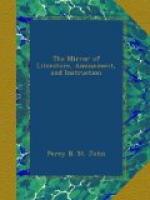lineaments—
Myself the cause—Albeit too proud for tears,
Yet touch’d with their sad doom, I little thought
I e’er should hate them thus.—Yet thus I hate them,
With all that bitter agony of soul
Which is the punishment of fiends. Alas!
It was my high ambition, to hold sway,
Sole, paramount, unquestion’d, o’er a third
Of Heaven’s resplendent legions:—Power and glory
Dwelt on them, like an elemental essence
That could not be destroyed.—I could not deem
That aught could so extinguish the pure fire
Of their sun-like beauty—yet ’tis changed!—
I gain’d them to my wish, and they are grown
Too hateful to be look’d on.—Thus I’ve seen
The frail fair dupe of amorous perfidy,
The victim of a smile,—by man beguiled—
Won to debasement, and then left in loathing:—
Alas! I cannot leave my fatal conquest!—
Man! would I were the humblest mortal wretch,
That crawls beneath yon shadowing temple’s tower,
Under the sky of Canaan; so I might
Lay down this weight of sceptred misery,
And fly for ever from myself and these!
But Pride reproves the wish; and—it is useless;
The unatonable deeds of ages rise
Like clouds between me and the throne of Grace.
I may not hope,—or fear,—still unsubdued,
As when I ruled the anarchy of Heaven,
I stand in Fate’s despite,—firm and impassive
To all that Chance, and Time, and Ruin bring.
—In that disastrous day, when this vast world
Shall, like a tempest-shaken edifice,
Rock into giant fractures—as the sound
Of the Archangel’s trump, upon the deep,
Bids fall the bonds of nature, to let forth
Destruction’s formless fiend from world to world,
Trampling the stars to darkness,—Even then,
Like that proud Roman exile, musing o’er
The dust of fallen Carthage, I shall stand,
Myself a solemn wreck, calm and unmoved
Among the ruins of the works of God.
And my last look shall be a look of triumph
O’er the fallen pillars of the deep and sky;
The wreck of nature by my deeds prepared—
Deeds—which o’erpay the power of Destiny.
Myself the cause—Albeit too proud for tears,
Yet touch’d with their sad doom, I little thought
I e’er should hate them thus.—Yet thus I hate them,
With all that bitter agony of soul
Which is the punishment of fiends. Alas!
It was my high ambition, to hold sway,
Sole, paramount, unquestion’d, o’er a third
Of Heaven’s resplendent legions:—Power and glory
Dwelt on them, like an elemental essence
That could not be destroyed.—I could not deem
That aught could so extinguish the pure fire
Of their sun-like beauty—yet ’tis changed!—
I gain’d them to my wish, and they are grown
Too hateful to be look’d on.—Thus I’ve seen
The frail fair dupe of amorous perfidy,
The victim of a smile,—by man beguiled—
Won to debasement, and then left in loathing:—
Alas! I cannot leave my fatal conquest!—
Man! would I were the humblest mortal wretch,
That crawls beneath yon shadowing temple’s tower,
Under the sky of Canaan; so I might
Lay down this weight of sceptred misery,
And fly for ever from myself and these!
But Pride reproves the wish; and—it is useless;
The unatonable deeds of ages rise
Like clouds between me and the throne of Grace.
I may not hope,—or fear,—still unsubdued,
As when I ruled the anarchy of Heaven,
I stand in Fate’s despite,—firm and impassive
To all that Chance, and Time, and Ruin bring.
—In that disastrous day, when this vast world
Shall, like a tempest-shaken edifice,
Rock into giant fractures—as the sound
Of the Archangel’s trump, upon the deep,
Bids fall the bonds of nature, to let forth
Destruction’s formless fiend from world to world,
Trampling the stars to darkness,—Even then,
Like that proud Roman exile, musing o’er
The dust of fallen Carthage, I shall stand,
Myself a solemn wreck, calm and unmoved
Among the ruins of the works of God.
And my last look shall be a look of triumph
O’er the fallen pillars of the deep and sky;
The wreck of nature by my deeds prepared—
Deeds—which o’erpay the power of Destiny.
Blackwood’s Magazine.
* * * * *
THE GATHERER.
“A snapper-up of unconsidered trifles.”
SHAKSPEARE.
ON A PICTURE OF HERO AND LEANDER.
By T. Hood.
Why, Lover, why
Such a water-rover?
Would she love thee more
For coming half seas over?
Why, Lady, why
So in love with dipping?
Must a lad of Greece
Come all over dripping?
Why, Cupid, why
Make the passage brighter?
Were not any boat
Better than a lighter?
Why, Maiden, why
So intrusive standing?
Must thou be on the stair,
When he’s on the landing?




